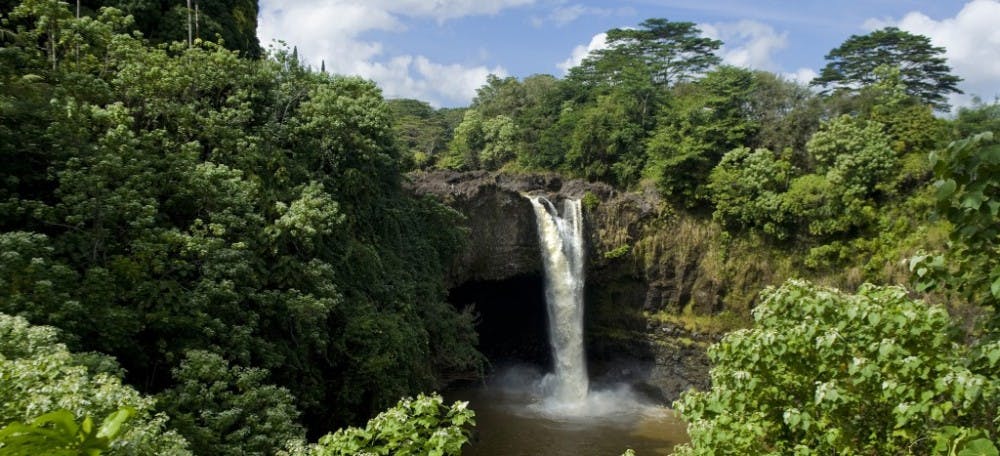Senior Laura McCabe counts Hawaii among her study abroad experiences, often provoking laughter from the prospective families to whom she gives campus tours.
“But when I tell them what I learned, they stop laughing,” she said.
While images of a sunny Hawaii attract those looking for a moment in paradise, the Winter Term course in the archipelago breaks through the facade of hula dancers and floral air.
For the two trip leaders — Jeffery Pugh, professor of religious studies, and Kenn Gaither, associate dean of the School of Communications and associate professor of communications — the three weeks in Hawaii provide a new lens through which to view the United States and the development of post-colonial culture.
Before leaving the Raleigh-Durham airport in 2010, McCabe remembers turning to Pugh and expressing guilt visiting a state marked by suppression of the indigenous people.
“After you learn about what we did to these people, you can’t look them in the face and feel justified being there because it is not your land,” McCabe said. “It’s theirs.”
Discussions during the preparatory course and interactions with local Hawaiians and Hawaiian elders communicate the resurgence of culture lost after the explorer Captain Cook invaded the island, she said.
“The dominant discourse we get about Hawaii is tourism, and what the dominant discourse ignores is the deep cultural implications of Hawaii and the cultural diversity,” Gaither said. “The course bulldozes the dominant discourse and digs much deeper to see what is there that is ignored in the branding of Hawaii as a tourist destination.”
[quote] The course bulldozes the dominant discourse and digs much deeper to see what is there that is ignored in the branding of Hawaii as a tourist destination. — Kenn Gaither, associate dean of the School of Communications and one of the trip leaders.[/quote]
Although the course was established in 1997, it did not continue last year because not enough students enrolled in the class. Pugh said he attributes the level of interest to the strong affiliation between Hawaii and tourism.
“I think people are far more interested in what sounds exotic and the understanding that there is an enormous amount of diversity within the United States gets lost,” he said.
The course, Hawaii: Nation or State? In Search of Hawaiian Identity, explores the conflicting opinions concerning Hawaii’s classification as one of the 50 states.
“We’re looking at the indigenous Hawaiian identity and there are a lot of people there in Hawaii that don’t believe Hawaii is a state, and that we are illegally occupying Hawaii and have been illegally occupying Hawaii,” Pugh said.
McCabe said the amount she did not know about a corner of her own country surprised her.
“I was shocked to learn they couldn’t speak their language and they had trouble tracing back their ancestral history,” she said. “Things we take for granted in our every day lives are things they struggle with to reclaim their history.”
The course examines the often overlooked piece of American history and studies the recovery of Hawaiian culture as a means to better understand the inhabitants’ identity. Pugh identified language as a significant component for the formation of identity in humans.
Hawaii serves as a microcosm for understanding the formation of cultural identity following imperialism.
“When we learn about that piece of colonialism, we can open a window to understand how the United States’ actions around the world are perceived today because it is looked at differently by those around the world that have this piece of history,” Pugh said.
As Hawaiian history straddles national and international studies, Elon University categorizes the course as a study abroad as well as a domestic study away program. The domestic program enables students to probe deeper into the nation’s history and reveals the diversity inherent within, Gaither said.
“What students can gain from a course like this is it broadens their aperture from viewing a country to viewing their world, and they have a better critical framework for the understanding of cultures and how they define themselves, and not just how they define external forces,” Gaither said.
Throughout the course, participants experience three different islands and four cities. The class starts in Honolulu and provides an introduction to urban Hawaii. The class then travels to rural Hilo, located on Hawaii, the Big Island. On Hawaii, students travel to Kona and study the recovery of the Hawaiian language. The last island visited is Maui. Nevertheless, students observe a common trend among the visited sites.
“The Hawaiian culture is not just one path,” McCabe said. “It’s holistic. Everything is connected.”


